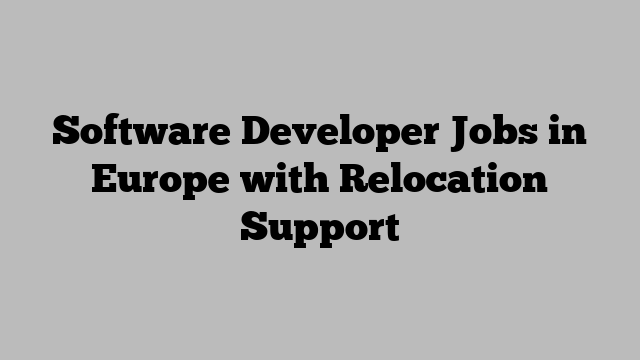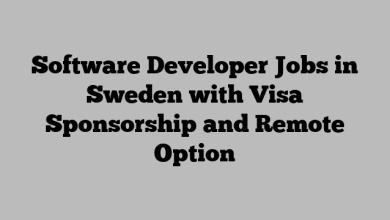Software Developer Jobs in Europe with Relocation Support

In 2025, software developers are among the most in-demand professionals across Europe. As digital transformation accelerates in both the public and private sectors, countries such as Germany, the Netherlands, Sweden, Ireland, and Estonia are actively recruiting international tech talent to fill critical gaps in their workforces.
For skilled programmers, engineers, and developers seeking international experience, Europe offers highly competitive salaries, visa sponsorships, and full relocation packages—including housing support, flight tickets, and language training. This guide explores the most promising opportunities for software developers in Europe, visa options, how to find legitimate jobs, and how to position yourself for a successful overseas tech career.
Why Europe Is Hiring Foreign Software Developers
Many European countries have rapidly expanding tech industries but not enough local developers to meet the demand. According to a 2024 EU Commission report, the region faces a shortage of nearly 1 million IT professionals. Startups, multinational corporations, fintech companies, and government agencies are all looking abroad for qualified candidates.
To attract global talent, several countries have simplified their immigration processes and introduced fast-track visa programs for tech workers, including the EU Blue Card, national tech visas, and startup relocation schemes.
Top European Countries Hiring Software Developers with Relocation
1. Germany
Germany is Europe’s largest economy and a booming tech hub. Cities like Berlin, Munich, and Hamburg are home to leading startups and enterprise-level tech teams.
- Popular Roles: Full Stack Developer, Java Engineer, DevOps Engineer, AI Engineer
- Average Salary: €50,000 – €90,000 per year
- Visa: EU Blue Card or German Work Visa (visa sponsorship common)
- Relocation: Many employers offer flights, visa assistance, and temporary housing
2. Netherlands
The Netherlands has a strong digital infrastructure and a pro-innovation government. English is widely spoken, and the tech ecosystem is diverse.
- Popular Roles: Backend Developer, Frontend Developer, React/Node.js Developer, Data Scientist
- Average Salary: €45,000 – €85,000
- Visa: Dutch Highly Skilled Migrant Visa
- Relocation: Commonly includes relocation bonus, tax benefits (30% ruling), and housing support
3. Sweden
Sweden’s tech industry is powered by companies like Spotify, Klarna, and Ericsson. The country is known for its high quality of life and worker protections.
- Popular Roles: Mobile App Developer, Python Developer, Systems Architect
- Average Salary: SEK 480,000 – 800,000 (~€42,000 – €70,000)
- Visa: Swedish Work Permit or EU Blue Card
- Relocation: Often includes family relocation, visa sponsorship, and onboarding support
4. Estonia
Estonia is a digital-first country and startup haven. It offers a streamlined visa process and friendly startup policies.
- Popular Roles: Web Developer, PHP Developer, Product Engineer
- Average Salary: €30,000 – €60,000
- Visa: Estonia Startup Visa or EU Blue Card
- Relocation: Startups often provide full relocation support and local language training
5. Ireland
Ireland is the European HQ for many US tech companies. The country is English-speaking and has strong immigration support for skilled tech workers.
- Popular Roles: Software Engineer, QA Automation Engineer, Cloud Developer
- Average Salary: €55,000 – €100,000
- Visa: Critical Skills Employment Permit
- Relocation: Visa assistance, flight reimbursement, housing stipends
Most In-Demand Programming Skills in Europe (2025)
If you’re proficient in the following, your chances of securing a visa-sponsored role increase significantly:
- JavaScript (React, Angular, Node.js)
- Python (Django, Flask, Data Science)
- Java (Spring, Hibernate)
- .NET / C#
- DevOps (Docker, Kubernetes, AWS, Azure)
- Mobile development (Kotlin, Swift, Flutter)
- Machine Learning & AI
- Cybersecurity & Cloud Infrastructure
Having experience with Git, REST APIs, CI/CD pipelines, and Agile/Scrum frameworks is also highly desirable.
Visa Options for Software Developers in Europe
EU Blue Card
The EU Blue Card is a residence and work permit for non-EU nationals in high-demand professions. It is valid across most EU countries (except Ireland and Denmark).
Requirements:
- Job offer with a gross annual salary of €45,000+ (lower in shortage occupations)
- Valid university degree or professional qualification
- Valid health insurance
- Application approved by host country’s migration authority
Country-Specific Tech Visas
Many countries have their own streamlined work permits for tech professionals:
- Germany: German Work Visa for IT Specialists (even without a degree)
- Netherlands: Highly Skilled Migrant Visa
- Estonia: Startup Visa for tech entrepreneurs and teams
- Ireland: Critical Skills Employment Permit for software professionals
- France: French Tech Visa for startup and tech workers
Remote Worker & Digital Nomad Visas
Some countries also allow skilled developers to work remotely for international employers through digital nomad visas. However, this option usually does not include relocation support.
Where to Find Legit Software Developer Jobs with Visa Sponsorship
International Tech Job Boards
- Relocate.me (https://relocate.me)
- WeAreDevelopers (https://www.wearedevelopers.com)
- Honeypot.io
- Landing.Jobs
- Stack Overflow Jobs
- GitHub Careers
European Job Boards
- EU Blue Card Network (https://www.apply.eu)
- Jobs in Germany (https://www.make-it-in-germany.com)
- Jobserve Ireland
- WorkinEstonia.com
- TogetherAbroad.nl (Netherlands)
Company Careers Pages
Check career sections of global companies like:
- SAP
- Booking.com
- Zalando
- Spotify
- Klarna
- Revolut
- N26
- Siemens
- Ericsson
Use search filters like “visa sponsorship,” “relocation offered,” or “international applicants welcome.”
How to Apply and Improve Your Chances
- Build a European-Style CV
Keep it clean and concise, 1–2 pages max. Highlight your programming languages, frameworks, recent projects, GitHub links, and relevant experience. - Craft a Compelling Cover Letter
Personalize it for each company. Explain why you’re excited to relocate and how your skills align with the role. - Polish Your Portfolio
Having a portfolio or GitHub with real projects gives you an edge. Showcase your problem-solving and creativity. - Prepare for Technical Interviews
Brush up on algorithms, system design, and real-world application debugging. Use platforms like LeetCode, HackerRank, and Interviewing.io. - Mention Your Visa Readiness
Let employers know you’re open to relocation and ready to start the visa process. It shows initiative and planning.
Salary Expectations and Cost of Living
Salaries for software developers vary across Europe:
- Germany: €50,000 – €90,000
- Netherlands: €45,000 – €85,000
- Sweden: €42,000 – €70,000
- Ireland: €55,000 – €100,000
- Estonia: €30,000 – €60,000
Cost of living is higher in major cities like Amsterdam, Berlin, Dublin, and Stockholm. However, relocation packages often include:
- Temporary housing (1–3 months)
- Airport pickup and travel costs
- Local tax/legal support
- Language classes
- Spouse/family relocation help
Living and Working in Europe
Europe offers rich cultural diversity, world-class healthcare, modern infrastructure, and stable job markets. Most countries provide strong worker protections, paid vacation, public healthcare access, and pension plans.
English is widely used in tech teams, especially in the Netherlands, Germany, and Sweden, though learning the local language is helpful for daily life.
Long-Term Benefits
- Possibility of permanent residency after 3–5 years
- Access to EU-wide mobility for jobs in other countries
- Opportunities to bring family members
- High quality of life and career development
- Diverse and inclusive work environments
Conclusion
Software developer jobs in Europe with relocation support are more accessible in 2025 than ever before. With the right skills, a strategic job search, and preparation, you could soon be working for a leading European company, earning a great salary, and living in one of the most vibrant tech communities in the world.
Start by researching target countries, tailoring your resume, applying to verified job boards, and connecting with recruiters who specialize in global placements. With persistence and the right mindset, a successful tech career in Europe is within your reach.




